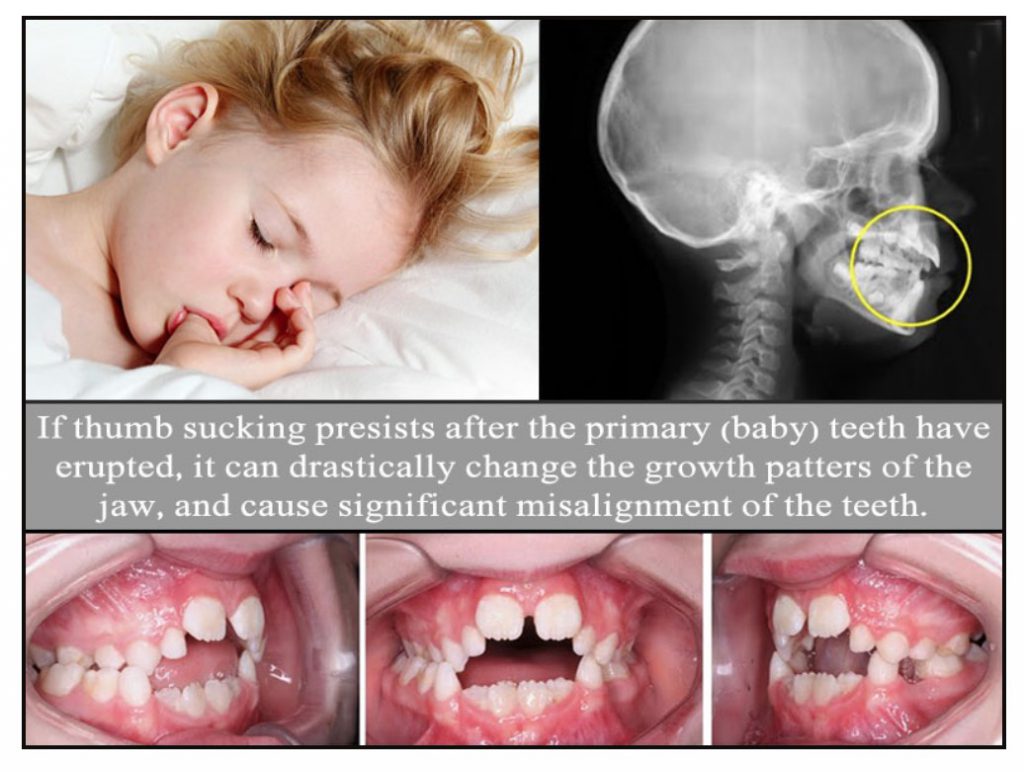Introduction
Thumb sucking is a common habit among infants and young children. While it may seem harmless, prolonged thumb sucking can have dental implications that can affect a child’s oral health. In this article, we will explore the dental implications of thumb sucking and provide tips on how to deal with this habit.
Why do children suck their thumbs?
Thumb sucking is a natural reflex for infants. It provides them with comfort and a sense of security. Most children outgrow this habit by the age of 4, but some may continue to suck their thumbs as a way to cope with stress or anxiety.
Dental implications of thumb sucking
While thumb sucking is normal in infants, prolonged and vigorous thumb sucking can lead to various dental problems:
1. Malocclusion
Thumb sucking can cause misalignment of the teeth, leading to malocclusion. The constant pressure from the thumb can push the teeth forward or cause them to tilt, resulting in an improper bite.
2. Open bite

One of the most common dental implications of thumb sucking is an open bite. This occurs when the front teeth do not meet when the child bites down. An open bite can affect speech development and make it difficult to chew properly.
3. Speech problems
Thumb sucking can also impact speech development. The improper alignment of the teeth and the open bite can affect the child’s ability to pronounce certain sounds correctly.
4. Dental infections
Constant thumb sucking can introduce bacteria into the mouth, increasing the risk of dental infections. The thumb can carry germs from various surfaces, and when it is constantly in contact with the mouth, it can lead to oral health issues.
How to deal with thumb sucking
It is important to address thumb sucking early on to prevent dental problems. Here are some strategies to help your child break the habit:
1. Positive reinforcement
Instead of scolding or punishing your child for thumb sucking, offer praise and rewards when they refrain from the habit.
Summary
Thumb sucking is a natural reflex for infants, providing them with comfort and security. However, if this habit persists beyond the age of 4 or 5, it can lead to various dental problems. The constant pressure and suction exerted on the thumb can cause the teeth to shift out of alignment, resulting in an open bite or an overbite. Additionally, prolonged thumb sucking can affect the development of the jaw and palate, leading to speech difficulties and improper chewing patterns.
To address thumb sucking, it is important to understand the underlying reasons behind the habit. Children may suck their thumbs due to anxiety, boredom, or as a means of self-soothing. Identifying the triggers can help parents and caregivers find alternative coping mechanisms for their child. Encouraging positive reinforcement, such as praise and rewards, can also motivate children to break the habit.
There are various strategies that can be employed to discourage thumb sucking. One approach is to create awareness by explaining the potential dental consequences to the child in a gentle and age-appropriate manner. Using reminders, such as band-aids or thumb guards, can serve as physical deterrents. Engaging the child in activities that keep their hands occupied, such as puzzles or arts and crafts, can also redirect their attention away from thumb sucking.
It is important to be patient and understanding during this process, as breaking a habit can take time. Consulting with a pediatric dentist or orthodontist can provide additional guidance and support. They may recommend the use of a dental appliance, such as a palatal crib or a tongue crib, to discourage thumb sucking and aid in proper dental development.
By addressing thumb sucking early on and implementing appropriate strategies, parents can help their children maintain optimal dental health and prevent long-term learn the facts here now complications. Breaking the habit not only benefits the child’s oral health but also contributes to their overall well-being and self-confidence.
- Q: Why do children suck their thumbs?
- A: Children often suck their thumbs as a way to self-soothe, feel secure, or as a natural reflex.
- Q: At what age should thumb sucking be a concern?
- A: Thumb sucking is considered normal in infants and toddlers. However, if the habit continues beyond the age of 4 or 5, it may lead to dental problems.
- Q: What are the dental implications of thumb sucking?
- A: Prolonged thumb sucking can cause misalignment of the teeth, an open bite, speech issues, and changes in the roof of the mouth.
- Q: How can thumb sucking affect the development of the jaw?
- A: Thumb sucking can put pressure on the developing jaw, leading to an improper bite and potential jaw misalignment.
- Q: What can parents do to help their child stop thumb sucking?
- A: Encouraging positive reinforcement, offering distractions, using thumb guards or bitter-tasting nail polish, and addressing any underlying emotional issues can help break the habit.
- Q: When should I seek professional help for thumb sucking?
- A: If your child’s thumb sucking habit persists beyond the age of 4 or 5, or if you notice significant dental or speech problems, it is advisable to consult a dentist or pediatrician.
- Q: Can a dentist help in correcting the dental issues caused by thumb sucking?
- A: Yes, a dentist can assess the extent of dental problems caused by thumb sucking and recommend appropriate treatments such as orthodontic appliances or speech therapy.

Welcome to my website! My name is Edward Bramston, and I am a dedicated Dental Anesthesiologist with a passion for providing exceptional care to patients of all ages. With years of experience in the field, I have developed a deep understanding of the importance of dental emergencies, children’s dentistry, and nutrition for oral health.

